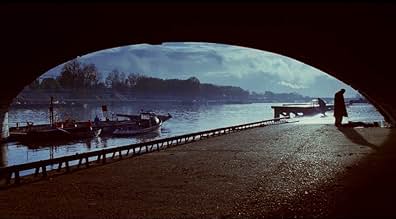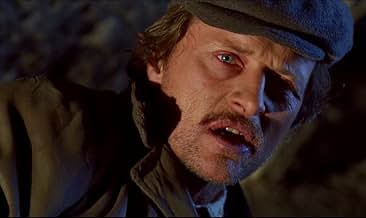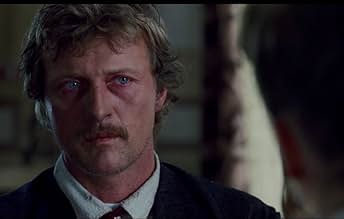IMDb-BEWERTUNG
7,1/10
2375
IHRE BEWERTUNG
Füge eine Handlung in deiner Sprache hinzuAn alcoholic homeless man is given two hundred francs by a stranger, who requests that when he can he will return the money to Saint Therese in the cathedral.An alcoholic homeless man is given two hundred francs by a stranger, who requests that when he can he will return the money to Saint Therese in the cathedral.An alcoholic homeless man is given two hundred francs by a stranger, who requests that when he can he will return the money to Saint Therese in the cathedral.
- Regie
- Drehbuch
- Hauptbesetzung
- Auszeichnungen
- 12 Gewinne & 3 Nominierungen insgesamt
Francesco Aldighieri
- Policeman
- (as Franco Aldighieri)
Empfohlene Bewertungen
Olmi is one of Europe's last Old Masters in the art of film making. He is usually regarded as a belated neo-realist, but after you've seen "The Legend of the Holy Drinker", you will realize the label simply does not stick. This is a film about spirituality, about communion, one of the most deeply religious movies ever, whose only rivals might be Dreyer's "Ordet" or Bergman's rather pretentious "faith trilogy" ("Through a Glass Darkly", "Winter Light" and "The Silence"). However, you will not find Scandinavian mists or angst in Catholic Olmi's adaptation of the beautiful novella written, oddly enough, by a great Jewish novelist, Joseph Roth. Wine is a metaphor for life, and Paris is a metaphor for our urban world. In this symbolic universe, it takes a great actor to give flesh and blood to the character of Andreas, the holy drinker, a beggar endowed with an amazing sense of dignity. Rutger Hauer was the man for the job: this was his best performance: he was never better, and, to judge from the course his career has taken, I fear he will never be better than in this film. It is not a thriller, but it is thrilling. It takes its own leisurely pace, but goes very far, very deep indeed into the human soul. After so many insipid or unpalatable cinematic concoctions, treat yourself to this film: it truly is vintage stuff.
Takeaway Scene
Rutger Hauer's biggest, joyful smile is for a bathtub.
The Good This is one of very few successful screen transpositions of an introspective literary work. The dialogue is sparse and in two languages but the film while making small adjustments here and there conveys all the internal monologue of Joseph roth's novella. Hauer. Probably his best performance (although I also like his understated character in lady Hawke). He is the icon of a getleman drunk. The photography. natural, unobtrusive, realistic. The cast: A very heterogeneous looking cast that manages to fit in well and act natural in their respective roles. The women: For a very Catholic director, Olmi is very kind to almost the women in the movie, including extras, and they look attractive without losing their real, unpolished authenticit
The Not So Good The film is almost real time,with long contemplative moments, to the point that sometimes the flashbacks have more action that the main scene. For all its photographical and acting beauty, the going can be slow, and watching Hauer drinking one longs to join in. I haven't counted them, but I suspect that matching the movie glass for glass would be lethal (especially the Cafe'-Calva followed by an Absinthe in the morning)
The Strange Hauer is a character living and dressing in the 1930s filmed in 1980s Paris. And it fits seamlessly, the same way that the real, surviving old bistrots and locations fit in their modern surroundings. Olmi has taken advantage of a phenomenon familiar to us all walking in cities and performed a sleight of hand trick, aided by the costume design of Ms. Marchand that emphasizes the continuity between periods to blend characters in.
The Good This is one of very few successful screen transpositions of an introspective literary work. The dialogue is sparse and in two languages but the film while making small adjustments here and there conveys all the internal monologue of Joseph roth's novella. Hauer. Probably his best performance (although I also like his understated character in lady Hawke). He is the icon of a getleman drunk. The photography. natural, unobtrusive, realistic. The cast: A very heterogeneous looking cast that manages to fit in well and act natural in their respective roles. The women: For a very Catholic director, Olmi is very kind to almost the women in the movie, including extras, and they look attractive without losing their real, unpolished authenticit
The Not So Good The film is almost real time,with long contemplative moments, to the point that sometimes the flashbacks have more action that the main scene. For all its photographical and acting beauty, the going can be slow, and watching Hauer drinking one longs to join in. I haven't counted them, but I suspect that matching the movie glass for glass would be lethal (especially the Cafe'-Calva followed by an Absinthe in the morning)
The Strange Hauer is a character living and dressing in the 1930s filmed in 1980s Paris. And it fits seamlessly, the same way that the real, surviving old bistrots and locations fit in their modern surroundings. Olmi has taken advantage of a phenomenon familiar to us all walking in cities and performed a sleight of hand trick, aided by the costume design of Ms. Marchand that emphasizes the continuity between periods to blend characters in.
A drunken homeless man (Rutger Hauer) in Paris is lent 200 francs by a stranger (Anthony Quayle) as long as he promises to repay it to a local church when he can afford to; the film depicts the man's constant frustrations as he attempts to do so.
This project started when producer Roberto Cicutto (Hotel Rwanda) bought the rights to Roth's book of the same name. A few directors were approached and turned the film down because the plot was too "thin" and "vague". Finally, Ermanno Olmi (Tree of Wooden Clogs) was suggested by Tullio Kezich's wife, and he accepted. Perhaps because of modesty, Kezich suggests that Olmi wrote the bulk of the script, with Kezich merely "watching him work". Kezich is best known as the film critic for Corriere della Sera and for his award-winning biography of director Federico Fellini.
According to Kezich, Robert DeNiro wanted the lead role, and Cicutto flew him to Europe to meet with Olmi. DeNiro was in awe of Olmi, but apparently the feeling was not mutual. Oddly, Rutger Hauer was wanted by Olmi because of his role in "The Hitcher" (1986), which makes little sense. Hauer himself concedes that he was more comfortable with action, and less comfortable with nuance.
In fact, Hauer was probably a better choice than DeNiro, despite the latter's bigger star power. Hauer is quite effective as the alcoholic, not overdoing it. The way he is dressed and presents himself makes the "holy drinker" an interesting character because on the surface he appears quite well-to-do when, in fact, he sleeps under a bridge.
Worth noting is Anthony Quayle, who has a small but important part, as he really commands attention from the audience just with his presence. Unlike Hauer, Quayle was primarily a stage actor, steeped in Broadway and Shakespeare. This may be why he so naturally comes off as "distinguished" because he certainly was.
The film won the Golden Lion at the 45th edition of the Venice Film Festival. It also won four David di Donatello Awards (for best film, best director, Best cinematography and best editing) and two Silver Ribbons (for best director and best screenplay). The film was selected as the Italian entry for the Best Foreign Language Film at the 61st Academy Awards, though it was not accepted as a nominee.
This mysterious tale -- almost a dark, dry comedy -- really comes to life on the Arrow Blu-ray. The special features are fairly slim, though the 25-minute interview with Kezich is enlightening and the 10-minute interview with Hauer is a joy. The best thing about this film is that it is now going to be available to a new audience. Though not well-known, it ought to be. In this reviewer's humble opinion, "Holy Drinker" is superior to "Tree of Wooden Clogs", and may be Hauer's finest role.
This project started when producer Roberto Cicutto (Hotel Rwanda) bought the rights to Roth's book of the same name. A few directors were approached and turned the film down because the plot was too "thin" and "vague". Finally, Ermanno Olmi (Tree of Wooden Clogs) was suggested by Tullio Kezich's wife, and he accepted. Perhaps because of modesty, Kezich suggests that Olmi wrote the bulk of the script, with Kezich merely "watching him work". Kezich is best known as the film critic for Corriere della Sera and for his award-winning biography of director Federico Fellini.
According to Kezich, Robert DeNiro wanted the lead role, and Cicutto flew him to Europe to meet with Olmi. DeNiro was in awe of Olmi, but apparently the feeling was not mutual. Oddly, Rutger Hauer was wanted by Olmi because of his role in "The Hitcher" (1986), which makes little sense. Hauer himself concedes that he was more comfortable with action, and less comfortable with nuance.
In fact, Hauer was probably a better choice than DeNiro, despite the latter's bigger star power. Hauer is quite effective as the alcoholic, not overdoing it. The way he is dressed and presents himself makes the "holy drinker" an interesting character because on the surface he appears quite well-to-do when, in fact, he sleeps under a bridge.
Worth noting is Anthony Quayle, who has a small but important part, as he really commands attention from the audience just with his presence. Unlike Hauer, Quayle was primarily a stage actor, steeped in Broadway and Shakespeare. This may be why he so naturally comes off as "distinguished" because he certainly was.
The film won the Golden Lion at the 45th edition of the Venice Film Festival. It also won four David di Donatello Awards (for best film, best director, Best cinematography and best editing) and two Silver Ribbons (for best director and best screenplay). The film was selected as the Italian entry for the Best Foreign Language Film at the 61st Academy Awards, though it was not accepted as a nominee.
This mysterious tale -- almost a dark, dry comedy -- really comes to life on the Arrow Blu-ray. The special features are fairly slim, though the 25-minute interview with Kezich is enlightening and the 10-minute interview with Hauer is a joy. The best thing about this film is that it is now going to be available to a new audience. Though not well-known, it ought to be. In this reviewer's humble opinion, "Holy Drinker" is superior to "Tree of Wooden Clogs", and may be Hauer's finest role.
This film embraces everything that contemporary Hollywood cinema is so afraid of - intelligence, moral complexity, and rich characterisation. It is a simple tale really - an alcoholic vagrant in Paris is lent 200 francs by a stranger, on condition that he repays it to a local chapel when he can afford it. But what makes this an extraordinary film is the manner in which we are drawn so completely into this seemingly trivial and futile quest. This is principally down to Rutger Hauer's towering performance as the haunted, suffering tramp, who has to battle both ill-fortune and his own past to repay the debt and find peace. There is little in the way of either dialogue or action, yet Ermanno Olmi's vision of a timeless, enchanted Paris is dazzling. A lesson to others in how to tell a story on film.
Dutch actor, Rutger Hauer plays the role of a Catholic-Pole and tramp - Andreas Kartack, living in penury in a a timeless Paris. He is approached by a generous dapper gentleman (English actor Anthony Quayle) who gives him 200 francs as long as he donates part of it to a local chapel. An ex-coal miner, in appearance, Kartack sports 'over the ears' wavy fair hair, rheumy eyes, a thin moustache and those tell-tale signs of the coal-mining trade - a rough tough job to say the least- a flat-cap and coal-dust underneath his fingernails. There are shots of him in a Polish mine-shaft and pit-village in an earlier life. He finds work, the company of women and companionship with fellow Poles but is let down by his alcoholism if not sense of stupidity. Based on Lemberg-born Jewish writer Joseph Roth's novel, why the film is poignant is hard to describe - perhaps relating to Slavs/East Europeans exiled from their homelands. The film has a rich spiritual feel, in fact it has that sense of art and spirituality seen in Dostoyevsky's novel, 'The Idiot' featuring the saintly epileptic Prince Leo or Tarkovsky's moving, 'Nostalghia' (1983). Paris seems like an organically glamourous city . For me, this is Hauer's finest performance after his role as the fair-haired French free spirit, Claude Maillot-Van Horn in Roeg's 'Eureka' (1983).
Wusstest du schon
- WissenswertesRobert De Niro was approached for the role of Andreas Kartak, but he turned down the offer because he was not convinced about the project.
- Crazy Credits"May God grant all of us, the drinkers, such a light and beautiful death". (Joseph Roth)
- VerbindungenFeatured in Het uur van de wolf: Rutger Hauer: Blond, blue eyes (2006)
Top-Auswahl
Melde dich zum Bewerten an und greife auf die Watchlist für personalisierte Empfehlungen zu.
- How long is The Legend of the Holy Drinker?Powered by Alexa
Details
- Erscheinungsdatum
- Herkunftsländer
- Sprachen
- Auch bekannt als
- The Legend of the Holy Drinker
- Drehorte
- Produktionsfirmen
- Weitere beteiligte Unternehmen bei IMDbPro anzeigen
Box Office
- Weltweiter Bruttoertrag
- 6.384 $
- Laufzeit
- 2 Std. 8 Min.(128 min)
- Farbe
- Sound-Mix
- Seitenverhältnis
- 1.85 : 1
Zu dieser Seite beitragen
Bearbeitung vorschlagen oder fehlenden Inhalt hinzufügen






















